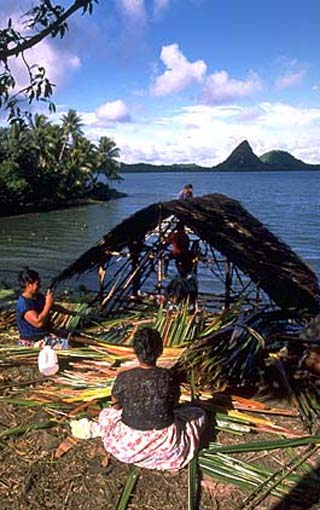2006.06.04: June 4, 2006: Headlines: COS - Micronesia: Medicine: Alternative Medicine: Personal Web Site: Micronesia Peace Corps Volunteer C. Lamond writes: Countless shades of blue
Peace Corps Online:
Directory:
Micronesia:
Peace Corps Micronesia :
The Peace Corps in Micronesia:
2006.06.04: June 4, 2006: Headlines: COS - Micronesia: Medicine: Alternative Medicine: Personal Web Site: Micronesia Peace Corps Volunteer C. Lamond writes: Countless shades of blue
Micronesia Peace Corps Volunteer C. Lamond writes: Countless shades of blue

"A few weeks ago, a four-month baby died primarily from malnutrition, amoeba, and pneumonia. The mother wasn’t breastfeeding. They knew the baby was sick and were treating him with local medicine until the baby’s last night on this earth. When they brought the baby to the hospital it was too late to save him. When the baby died, many people blamed the hospital. It furthered my realization of just how deep this hatred of western medicine runs in some people. The hospital is seen as a place to go to die. People wonder how the doctors can sleep at night…as if they’re responsible for every death. Conversations with locals who think this way are very challenging for me. When I feel myself becoming heated, I take a deep breath, listen to the whys, and remember that I have a thousand years of a culture to learn about. The whole situation intensifies my efforts to extend preventive medicine here. Teaching women about the importance of breastfeeding…it seems such a simple thing. It just seems such a simple thing. "
Micronesia Peace Corps Volunteer C. Lamond writes: Countless shades of blue
Sunday, June 04, 2006
Countless shades of blue
[Excerpt]
A few weeks ago, a four-month baby died primarily from malnutrition, amoeba, and pneumonia. The mother wasn’t breastfeeding. They knew the baby was sick and were treating him with local medicine until the baby’s last night on this earth. When they brought the baby to the hospital it was too late to save him. When the baby died, many people blamed the hospital. It furthered my realization of just how deep this hatred of western medicine runs in some people. The hospital is seen as a place to go to die. People wonder how the doctors can sleep at night…as if they’re responsible for every death. Conversations with locals who think this way are very challenging for me. When I feel myself becoming heated, I take a deep breath, listen to the whys, and remember that I have a thousand years of a culture to learn about. The whole situation intensifies my efforts to extend preventive medicine here. Teaching women about the importance of breastfeeding…it seems such a simple thing. It just seems such a simple thing.
I guess I haven’t really talked much about the traditional vs. western medicine much. Its truly an amazing experience for me, as I am able to see extensive benefits of each and contemplate ways in which the two could collaborate and mutually benefit from the other. I’ve studied about indigenous theories of contagious disease, but it is brought to light when living with the people. Some of the local treatments work wonders. Burn victims, for example, heal without so much as a scar. Others are not as successful, and could be potentially harmful when, as in the case of the baby, the people rely solely on a local remedy when further care is needed. There is also an element of calling upon the spirits that adds to the complexity of its lack of acceptance in western medicine. I argue the concepts of science and spirituality, and I still believe in the power of prayer. The major problem lies in the total discounting of the other methods worth. The health centers we are establishing plan to incorporate traditional healers in decision making with the local health councils and allow the opportunity for local medicine to be an option through the facilities. There are so many issues that will have to be dealt with in order for this to become even somewhat possible, more than I can talk about here. Ask me about it sometime though, I’d love to know what you think.
Links to Related Topics (Tags):
Headlines: June, 2006; COS - Micronesia; Directory of Micronesia RPCVs; Messages and Announcements for Micronesia RPCVs; Medicine; Alternative Medicine
When this story was posted in December 2006, this was on the front page of PCOL:





Peace Corps Online The Independent News Forum serving Returned Peace Corps Volunteers
 | Ron Tschetter in Morocco and Jordan
On his first official trip since being confirmed as Peace Corps Director, Ron Tschetter (shown at left with PCV Tia Tucker) is on a ten day trip to Morocco and Jordan. Traveling with his wife (Both are RPCVs.), Tschetter met with volunteers in Morocco working in environment, youth development, health, and small business development. He began his trip to Jordan by meeting with His Majesty King Abdullah II and Her Majesty Queen Rania Al Abdullah and discussed expanding the program there in the near future. |
 | Chris Dodd's Vision for the Peace Corps
Senator Chris Dodd (RPCV Dominican Republic) spoke at the ceremony for this year's Shriver Award and elaborated on issues he raised at Ron Tschetter's hearings. Dodd plans to introduce legislation that may include: setting aside a portion of Peace Corps' budget as seed money for demonstration projects and third goal activities (after adjusting the annual budget upward to accommodate the added expense), more volunteer input into Peace Corps operations, removing medical, healthcare and tax impediments that discourage older volunteers, providing more transparency in the medical screening and appeals process, a more comprehensive health safety net for recently-returned volunteers, and authorizing volunteers to accept, under certain circumstances, private donations to support their development projects. He plans to circulate draft legislation for review to members of the Peace Corps community and welcomes RPCV comments. |
 | He served with honor
One year ago, Staff Sgt. Robert J. Paul (RPCV Kenya) carried on an ongoing dialog on this website on the military and the peace corps and his role as a member of a Civil Affairs Team in Iraq and Afghanistan. We have just received a report that Sargeant Paul has been killed by a car bomb in Kabul. Words cannot express our feeling of loss for this tremendous injury to the entire RPCV community. Most of us didn't know him personally but we knew him from his words. Our thoughts go out to his family and friends. He was one of ours and he served with honor. |
 | Peace Corps' Screening and Medical Clearance
The purpose of Peace Corps' screening and medical clearance process is to ensure safe accommodation for applicants and minimize undue risk exposure for volunteers to allow PCVS to complete their service without compromising their entry health status. To further these goals, PCOL has obtained a copy of the Peace Corps Screening Guidelines Manual through the Freedom of Information Act (FOIA) and has posted it in the "Peace Corps Library." Applicants and Medical Professionals (especially those who have already served as volunteers) are urged to review the guidelines and leave their comments and suggestions. Then read the story of one RPCV's journey through medical screening and his suggestions for changes to the process. |
 | The Peace Corps is "fashionable" again
The LA Times says that "the Peace Corps is booming again and "It's hard to know exactly what's behind the resurgence." PCOL Comment: Since the founding of the Peace Corps 45 years ago, Americans have answered Kennedy's call: "Ask not what your country can do for you--ask what you can do for your country. My fellow citizens of the world: ask not what America will do for you, but what together we can do for the freedom of man." Over 182,000 have served. Another 200,000 have applied and been unable to serve because of lack of Congressional funding. The Peace Corps has never gone out of fashion. It's Congress that hasn't been keeping pace. |
 | PCOL readership increases 100%
Monthly readership on "Peace Corps Online" has increased in the past twelve months to 350,000 visitors - over eleven thousand every day - a 100% increase since this time last year. Thanks again, RPCVs and Friends of the Peace Corps, for making PCOL your source of information for the Peace Corps community. And thanks for supporting the Peace Corps Library and History of the Peace Corps. Stay tuned, the best is yet to come. |
 | History of the Peace Corps
PCOL is proud to announce that Phase One of the "History of the Peace Corps" is now available online. This installment includes over 5,000 pages of primary source documents from the archives of the Peace Corps including every issue of "Peace Corps News," "Peace Corps Times," "Peace Corps Volunteer," "Action Update," and every annual report of the Peace Corps to Congress since 1961. "Ask Not" is an ongoing project. Read how you can help. |
Read the stories and leave your comments.

Some postings on Peace Corps Online are provided to the individual members of this group without permission of the copyright owner for the non-profit purposes of criticism, comment, education, scholarship, and research under the "Fair Use" provisions of U.S. Government copyright laws and they may not be distributed further without permission of the copyright owner. Peace Corps Online does not vouch for the accuracy of the content of the postings, which is the sole responsibility of the copyright holder.
Story Source: Personal Web Site
This story has been posted in the following forums: : Headlines; COS - Micronesia; Medicine; Alternative Medicine
PCOL35343
13


















